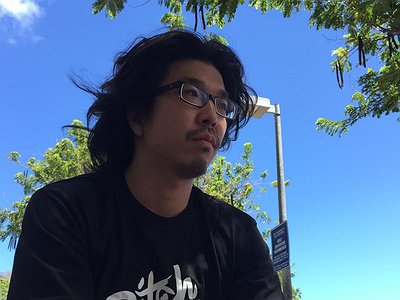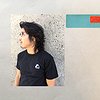Part 1
Name: Ryan Choi
Occupation: Composer, Ukeleleist
Current Releases: Whenmill on Off
Musical Recommendations: I couldn't; there are too many to mention and I would regret naming names. "The real voyage of discovery consists not in seeking new landscapes, but in having new eyes."
Website: ryanckchoi.com
When did you start composing - and what or who were your early passions and influences?
I can't pinpoint an exact date, and it depends on how you define composing. Off the cuff, two senses come to mind: notating or making scores, and making or creating, regardless of mode. I can't remember a time when music wasn't a part of my life, even though I don't come from an outwardly musical family. My father, who was a businessman, instilled an appreciation of classical music and my mother, along with her siblings, was trained in the Onoe school of Japanese classical dance and has an intuitive feeling for rhythm and pitch. I played double bass in orchestra from the fifth grade until about halfway through my university studies. Within a couple of years of starting the bass, I was spending a lot of time hermetically, soaking up scores and books on theory, experimenting with the bass and piano and the other string and percussion instruments in the orchestra room, unknowingly, and idiosyncratically, engaged in "free" improvisation. Early in high school I began dabbling in scoring and arranging and I was introduced by chance to the ukulele, an instrument that quickly became a fixation and eventually the focus of my first two releases, Three Dancers and Whenmill. Another early passion, and one which is still a part of my life today, was skateboarding. I've also spent time writing and translating Japanese literature into English.
For most artists, originality is first preceded by a phase of learning and, often, emulating others. What was this like for you? How would you describe your own development as an artist and the transition towards your own voice?
When I was first starting out, I was almost wholly dependent on the works of others as modes of expression. I used to set bold transcriptional goals for myself on the ukulele, which, traditionally tuned, often lacked the range to accommodate the works that I sought to transcribe (my penchant for extended tunings has roots in this). This fact didn't deter me from trying anyway, and, not unusually, failing, deviating drastically from my intended target. I emulated copiously, and unabashedly, whatever fell my way by ear or sight or score, all while skating and dreaming grandiosely of future other lives (a defining mark of youth). In my later twenties, after a period of musical dormancy when it seemed as if I might not make music again, I emerged with the (apparently) original pieces (the first ever by my own measure) that make up my first releases, though, when I listen now to a never-released EP that I did at 19, I can hear in one of the pieces signs of what was to follow. A lot had happened beneath the surface. My return to music seemed as simple as me picking up my instrument again one day out of the blue.
What were some of the most important creative challenges when starting out as a composer and how have they changed over time?
The problems that plagued me then are the same ones that plague me now: I speak of both beginnings and ends, and by this I mean, first, getting to work and then, alas, moving on from a work. Paul Valery has a line perfectly resonant with the travail: "poems are never finished, only abandoned".
Could you take me through the process of composing on the basis of one of your pieces that's particularly dear to you, please? What do you start with when working on a new piece, for example, how do you form your creative decisions and how do you refine them?
Because each piece has its own genealogy, it's difficult to single one out as an exemplar of the rest, and quite beyond my calling as an artist. I'm not, nor can I be, a scholar of my own work, at least not one with the sort of olympian objectivity that the role requires. But, to be a good sport, I'll try and fabricate an apologia for one of those pieces whose processes I feel I can remember. In "Inn Blue", I began only with the motif (floating around in my head) that the ukulele states in the opening bars and repeats and develops improvisationally throughout the piece (the same motif guest stars in "Quixano"), but I don't know where it came from; it just appeared one rainy day; I don't even remember where I was.
A word on titles: I rarely begin with them. They give my music only the appearance - or rather the option - of being programmatic. Although the title track of my album Three Dancers was taken from Picasso's Le Trois Danseuses, I hadn't been aware of the painting until one day, after I had finished mixing the then nameless piece, I chanced upon it on the internet while browsing through images of art from the 1920s. Its title in English, more than the image itself, struck me as what I needed, so I cribbed it.
Tell us about your studio/work space, please. What were criteria when setting it up and how does this environment influence the creative process? How important, relatively speaking, are factors like mood, ergonomics, haptics and technology for you?
I work at home; I write at home; I record at home. I'm most adventurous when I'm at home recording privately; in public performance, I seek safety in the familiar, which is antithetical to what I'm doing. None of the spaces in my home are superior to the others per se; each space, and this includes mental spaces, has its own voice.
What, if anything, do you personally draw from the cosmos of electronic music and digital production tools that is inspiring for your daily practise? In how far do you see the potential for a mutual creative pollination between the two?
As long as technology advances, there will be potential for symbiosis between musicians and technology. Before I learned to record and use the computer musically (one of the most formative artistic steps I've taken) everything I played and then did not remember afterwards was lost (which was almost everything). Now I can push record on a device and play with the microphone there dually as stenographer and audience member, who, by hearing, incite ideas that might be shy except in performance. I'm able to keep a record that I couldn't keep before, not because the means weren't available, but because I was long too indolent to learn. Once I did, a codependence set in that continues to alter me in hard-to-fathom ways. Nowadays, I dislike playing without a net in place to catch my playing, a feeling that would've been foreign to a younger version of myself. Listening to yourself play over and over and over brings you maddeningly face to face with the habits that litter your playing, and in subsequent pieces - in putatively "new" pieces - you adjust your playing accordingly, and not always to your knowledge, so that one piece ends up differing from another only in degree, as reactions of a self to itself and others. Much has been said about the ongoing cyborgization of man evolved to assimilate his tools as appendages on par with limbs; the sensory cortex is acquisitive, anyone who habitually wears glasses will tell you of the bizarre experience they have of reaching up to the bridge of their nose to adjust glasses that aren't there. One only needs to reflect briefly on the connection we have with our computers - of which the mobile phone is one type - to get a glimpse of what we're becoming, and may yet fail to become.






